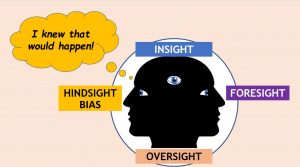

I’ve always been fascinated by words and phrases. I came across a phrase in an online article that I wasn’t familiar with: Hindsight Bias. I’d never heard the phrase before, but I was familiar with its effects on clients in my practice.
The article itself was by veterinarian Dr. Karen Fine. She observed many of the owners struggled with Hindsight Bias after they made a decision to end a companion pet’s life even when it was clear that their pet was severely suffering. Dr. Fine explores the challenge of facing that decision and the afterthoughts people have and “why are we often so racked with not only sadness but also guilt when we look back at the moment we made the decision?” That later guilt, when looking back at the decision, is grounded in “Hindsight Bias”.
What is Hindsight Bias
Hindsight Bias (HB for short) is the tendency, after an event has occurred, to overestimate the extent to which the outcome could have been foreseen. You might know it as “Woulda, Coulda, Shoulda. or “I knew it all along” effect which is distorted thinking where individuals overestimate their ability to predict the outcome of an event after it has already occurred. “HB” can cause people to believe that an event was more predictable than it was.
Negative HB shows up in my clients’ lives when there has been some level of life trauma or painful disruption. It can be illness, relationship difficulties, or financial events. Now, knowing how the event played out, people may beat themselves up about what they should have done differently to potentially avoid the negative result.
Positive and Negative
There are choices we make that we can rightly regret. Learning to live and to learn from them is part of life. HB can be used positively if used to look back to review your decision-making process. Unfortunately, I see clients negatively affected as they get stuck obsessing and ruminating about a decision. In doing so, they pile on the guilt and sadness that interferes with living in the present. There’s no way to be certain which future path will ultimately materialize. Regardless of which scenario plays out, people become convinced that “they should have seen it coming.”
4 Ways to Manage Hindsight Bias
- Review other possible outcomes. Consider the outcomes that did not unfold or could have unfolded. By reviewing the other possible outcomes, an event will seem less inevitable and foreseeable.
- Keep a decision journal. If HB is a chronic issue for you, another suggestion is to keep a “decision journal” which details your decisions and what you were thinking when you made them. Having access to an accurate history can help you realize that you had sound reasons at the time.
- Use simple Self-talk. Remind yourself that no one can predict the future. Remind yourself that you have made good decisions in the past.
- Examine the data- This tool is based in Cognitive Behavioral Thinking. Don’t exclusively focus on your emotions or even your thoughts (you can think incorrect thoughts, right?). But ask yourself what the data is; what are the objective facts when looking at the situation.
If you are interested in the subject, you can find the story in the New York Times under “Ending Your Pet’s Life Was the Right Decision. So Why Do You Feel So Guilty?” by Dr. Karen Fine.


Leave a Reply